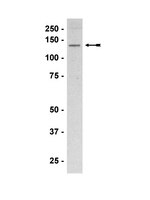TJ0711, a novel vasodilatory β-blocker, protects SHR rats against hypertension induced renal injury.
Yang, Juan, et al.
Am J Transl Res, 5: 279-90 (2013)
2013
Mostra il sommario
Previous studies suggested that β-blockers with adjunctive α1-blocking activities warrant renoprotective function other than the therapeutic effect on hypertension. The current report is designed to dissect the role of TJ0711, a novel β-blocker with a 1:1 ratio for the β1/α1 blocking activities, in renoprotection in SHR rats. It was noted that TJ0711 possesses similar potency for control of blood pressure as that of Carvedilol. However, TJ0711 is much more potent in terms of protecting SHR rats against hypertension induced renal injury. Specifically, SHR rats treated with 20mg/kg/day of TJ0711 manifested significantly lower levels for urine albumin and total protein. In line with these result, TJ0711 treated rats displayed much less severe pathological changes in the kidneys. Mechanistic studies revealed that TJ0711 improves kidney perfusion during the course of hypertensive insult by enhancing eNOS expression through suppressing inflammatory cytokine secretion. TJ0711 also attenuates Vasohibin-1 expression to prevent HIF-1α from signal-induced degradation, and by which it promotes HO-1 expression to protect SHR rats against oxidative stress induced by hypertension in the kidneys. Together, our data suggest that TJ0711 possesses higher potency for renoprotection while manifesting the similar effect on hypertension therapy as Carvedilol. | | 23634239
 |
Apigenin inhibits the TNFα-induced expression of eNOS and MMP-9 via modulating Akt signalling through oestrogen receptor engagement.
Daniela Palmieri,Patrizia Perego,Domenico Palombo
Molecular and cellular biochemistry
371
2011
Mostra il sommario
Apigenin is a naturally occurring plant flavone with strong anti-oxidant and anti-inflammatory activity. While the anticancer properties of Apigenin have been extensively studied, little is known about its effects on endothelial dysfunction. We investigated the effects of Apigenin in EAhy926 endothelial cells exposed to TNFα by evaluating the expression of eNOS and MMP-9, two key molecules in endothelial dysfunction. MMP-9 activity was measured by gel zymography. Western blot analysis was performed to analyze eNOS expression and signal transduction. Treatment with Apigenin (50 | | 22899172
 |
Fetal pulmonary vascular remodeling in a rat model induced by hypoxia and indomethacin.
Xue-Feng Xu,Wei-Zhong Gu,Xi-Ling Wu,Ru-Yi Li,Li-Zhong Du
The journal of maternal-fetal & neonatal medicine : the official journal of the European Association of Perinatal Medicine, the Federation of Asia and Oceania Perinatal Societies, the International Society of Perinatal Obstetricians
24
2010
Mostra il sommario
This study sought to determine the effect of combined treatment of hypoxia plus indomethacin on pulmonary vascular remodeling in fetal rats. | | 20459333
 |
Functional protein network activation mapping reveals new potential molecular drug targets for poor prognosis pediatric BCP-ALL.
Accordi, Benedetta, et al.
PLoS ONE, 5: e13552 (2010)
2009
Mostra il sommario
In spite of leukemia therapy improvements obtained over the last decades, therapy is not yet effective in all cases. Current approaches in Acute Lymphoblastic Leukemia (ALL) research focus on identifying new molecular targets to improve outcome for patients with a dismal prognosis. In this light phosphoproteomics seems to hold great promise for the identification of proteins suitable for targeted therapy. | | 21042412
 |
BDNF/TrkB content and interaction with gastrin-releasing peptide receptor blockade in colorectal cancer.
Caroline Brunetto de Farias,Denis Broock Rosemberg,Tiago Elias Heinen,Patricia Koehler-Santos,Ana Lucia Abujamra,Flávio Kapczinski,Algemir Lunardi Brunetto,Patricia Ashton-Prolla,Luise Meurer,Maurício Reis Bogo,Daniel C Damin,Gilberto Schwartsmann,Rafael Roesler
Oncology
79
2009
Mostra il sommario
Neurotrophin and neuropeptide pathways are emerging targets in cancer. Here we show that brain-derived neurotrophic factor (BDNF) and its receptor, TrkB, are present in colorectal cancer and that BDNF levels are increased in tumors compared to nontumor tissue. In addition, we investigate the role of BDNF in influencing the response of colorectal cancer cells to inhibition of gastrin-releasing peptide receptors (GRPR). | | 21474968
 |













